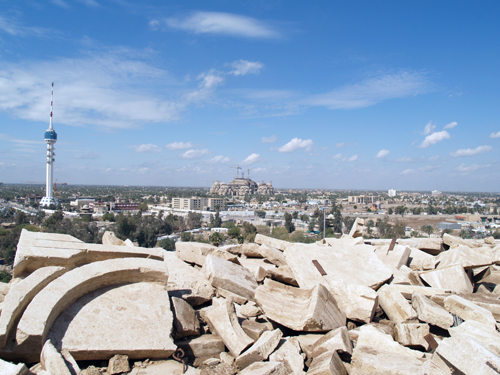
Entry Control

The skyline of Baghdad from the bombed-out dome of Al Salam palace. (Dimiter Kenarov)
The sky over Baghdad is deep blue. Last night’s rain has washed the air spick-and-span. The day billows with promise—all green palms and golden mosques. Even the Aerostats, the ominous zeppelin-shaped surveillance balloons floating on the outer perimeter of the city, look somehow festive, like balloons at a party, and the bombed-out dome of Saddam’s Al Salam Palace perches atop downtown Baghdad like a birthday hat. Iraq’s big bash, the parliamentary elections, is still days away, but preparations have long been in the works. Some are pasting election posters over the blast walls; others are putting up colorful election slogans on the barbed wire fences. IHEC (Independent High Electoral Commission) is trying to make sure there will be enough paper ballots for everyone involved. And those tough guys with the guns out there—they are the election’s bouncers.
The International Zone, the seat of Iraq’s government, has six major ECPs (Entry Control Points), all of them guarded by armed-to-the-teeth men and women from half the world’s nations and races. The International Zone is like the sanctuary of the Holy Grail, and to gain unauthorized access is virtually impossible. There is the Iraqi Army, with its new Humvees and tanks and armored personnel vehicles, showing off their brass at every possible occasion. There are the courteous Kurdish Peshmergas, proud but highly disciplined soldiers, unwilling to associate with the rabble of the Iraqi Army. There are the Ugandan contractors, the most fearsome of the lot, dedicated to their job to the point of blind fanaticism: if you don’t have your papers in order, there is no way on earth you are passing by the Ugandans. And finally, somewhere deep in the shadows, there lurks the US Army, its ranks silently dwindling, troops tiptoeing backward toward home. “Shock and awe” has been downgraded to “assist and advise.”
Today I am stationed at a pedestrian checkpoint, ECP 3, near the Iraqi parliament and Al Rasheed hotel. A long stretch of sidewalk flanked by blast walls and fences, interspersed with several search booths, ECP 3 is the tunnel of truth. To enter the International Zone, the Promised Land of Iraqi bureaucracy, each pedestrian needs to pass the three great challenges: the Iraqi Army, the Peshmergas, the Ugandans. Patdowns, scanners, metal detectors. Men to the right, women to the left. It’s all about separating the sheep from the goats. To assure quality control, a few US soldiers are always present, but their power is largely symbolic. “We are not here to order them around,” says Sergeant Richard Burlingame, from the 16th Military Police Brigade, 551st Company. “We are here only to advise them on how they could do their job better.” It’s today’s most popular mantra. We are not in charge anymore so don’t ask us to solve somebody else’s problems. The Iraqi elections, in the eyes of the US military, are not so much a proof of democracy taking root in the country as a way to cut at the roots of the problem. To put it bluntly, the upcoming Iraqi elections are a way to get rid of Iraq, once and for all.
The best part of the day at ECP 3 is uneventful, tedious, an endless line of pedestrians passing. Then, suddenly, a commotion. Not a suicide bomber, but something much more mundane and at the same time more terrifying. One of the local Iraqi interpreters, code-named Mimi, comes in crying, and it takes her some time before she can tell her story to the Americans. An Iraqi soldier has threatened to kill her. “It’s not the first time,” Mimi says. “When nobody’s looking, he would turn to me and say, ‘You, American whore. I’m going to cut your throat one of these days.’ He hates me because I don’t cover my hair, because I tell my Ugandan friends the terrible stuff he says about them.” Her tears are streaming down her cheeks, down on the ground. “Please,” Mimi addresses the US troops, “Please, help me. Let them transfer me to another checkpoint.” Sergeant Gault, a no-nonsense man, tall and dignified, with a dash of white in his eyebrows, swings into action. He calls in the Iraqi soldier, then calls in his supervisor, and demands that the incident be reported immediately to the higher Iraqi command. He wants an investigation opened. The problem individual should be transferred to another unit or disciplined. His words are politely ignored. It is just that the US troops can’t demand anything anymore, even if their cause is just. Mimi stands by Gault’s side, small and vulnerable, visibly worried as the Iraqi soldiers stare her down. She knows what is in store for her after the Americans leave. One of the other interpreters, a woman in her forties, whispers in my ear: “I’m getting out of this country. I’m applying for my US visa and getting out. I’m not going to vote in the elections. This country is finished. There’s nothing left for me here.”
Dimiter Kenarov is in Baghdad with a grant from the Pulitzer Center on Crisis Reporting. Learn more about this project on the Pulitzer website.

